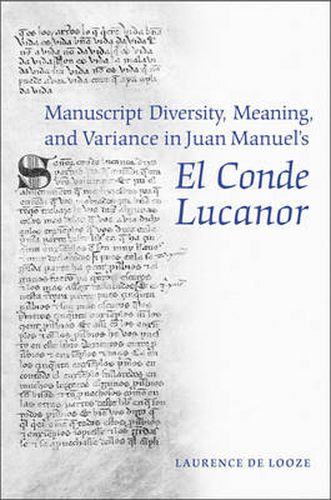Readings Newsletter
Become a Readings Member to make your shopping experience even easier.
Sign in or sign up for free!
You’re not far away from qualifying for FREE standard shipping within Australia
You’ve qualified for FREE standard shipping within Australia
The cart is loading…






Juan Manuel’s El Conde Lucanor was arguably one of the great masterworks of early modern Spain. Although the work appears in five very different manuscript versions from the fourteenth to the sixteenth centuries, most modern editions of El Conde Lucanor have neglected to account for the fact that it was part of a manuscript tradition, and that its meaning is substantially affected when its original forms are not taken in to account. With Manuscript Diversity, Meaning, and Variance in Juan Manuel’s El Conde Lucanor, Laurence de Looze demonstrates how the meaning of Juan Manuel’s work changes depending on how the work is ‘performed’ in particular manuscripts. This study proceeds from the assumption that, in a pre-printing press world, each new copy or ‘performance’ of a work creates new meaning. By adopting this approach and by focusing on Parts II-V of the texts, de Looze argues that El Conde Lucanor raises questions about the interretation, intelligibility, and the production of knowledge. De Looze’s complex and nuanced reading sheds new light on an important work and makes a significant contribution to medieval studies, Spanish studies, and the history of the book.
$9.00 standard shipping within Australia
FREE standard shipping within Australia for orders over $100.00
Express & International shipping calculated at checkout
Juan Manuel’s El Conde Lucanor was arguably one of the great masterworks of early modern Spain. Although the work appears in five very different manuscript versions from the fourteenth to the sixteenth centuries, most modern editions of El Conde Lucanor have neglected to account for the fact that it was part of a manuscript tradition, and that its meaning is substantially affected when its original forms are not taken in to account. With Manuscript Diversity, Meaning, and Variance in Juan Manuel’s El Conde Lucanor, Laurence de Looze demonstrates how the meaning of Juan Manuel’s work changes depending on how the work is ‘performed’ in particular manuscripts. This study proceeds from the assumption that, in a pre-printing press world, each new copy or ‘performance’ of a work creates new meaning. By adopting this approach and by focusing on Parts II-V of the texts, de Looze argues that El Conde Lucanor raises questions about the interretation, intelligibility, and the production of knowledge. De Looze’s complex and nuanced reading sheds new light on an important work and makes a significant contribution to medieval studies, Spanish studies, and the history of the book.